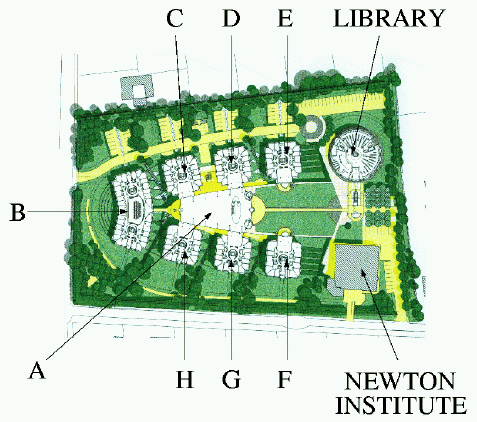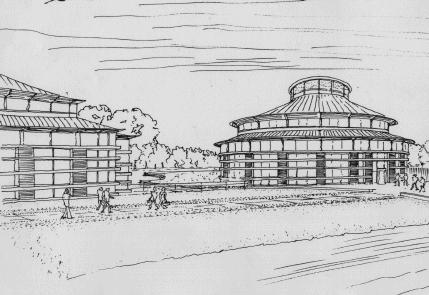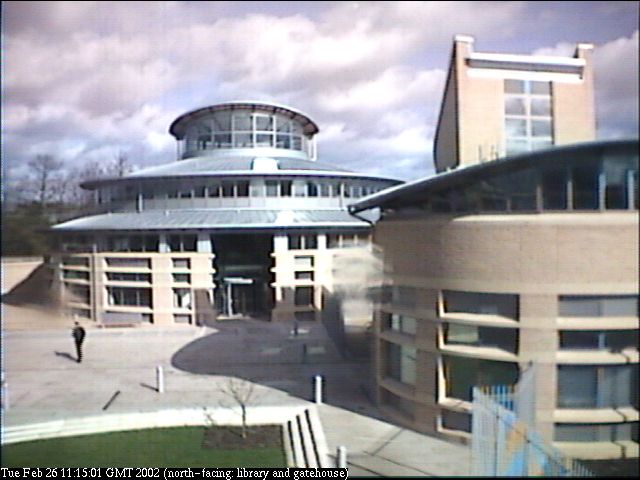The Library opened on 1 October 2001 and is part of the main University Library, as well as being the departmental library for the two mathematics departments. It covers the physical sciences, technology and mathematics and has been made possible through the generosity of Dr and Mrs Moore. It contains the relevant periodicals previously held in the Scientific Periodicals Library, and books from the main library. It is housed in purpose-built accommodation of imaginative design in the north-eastern corner of the site. Construction began in February 2000 and the Library was handed over to the University in July 2001.

 |
Architect's sketch of the new Library, with a corner of pavilion E, one of the mathematics pavilions. |
 |
The Library on 15 August 2001. The Faulkes Gatehouse is at the front on the right. |
The rationale
P K Fox, University Librarian
Almost all those concerned with thinking about and planning the information provision of the future are convinced that the notion of the fully electronic library and thus the elimination of the library as a place, is a myth. Even in the sciences, the library will remain a hybrid - retaining traditional books and journals alongside electronic resources - for a very long time. There will probably be a gradual change in space use as the need for good quality, high-technology study space increases and as the output of paper journals declines. The proposed Library at Clarkson Road will be designed to meet the needs of library users on the day it opens but also to be flexible enough to allow the University to respond to changes in the modes of access to information.
Electronic information
An increasing amount of information will be made available electronically, either directly to the scholar from services such as e-print archives or via intermediaries such as CHEST. The charging mechanisms for electronic data are far from stable and it is likely that access to some services will have to be restricted to library use because of the cost implications of providing wider access.
Older material
Even in the physical sciences and technology, significant use is made of older articles, which are not available electronically. The major journals will probably be scanned and digitised over a period of years, but many will not, and the librarys traditional role of providing access to such journals will remain. A study of scientific and technical publishing carried out in 1997 by the Royal Society and others indicated a concern that electronic publishing made the holding of national collections of hard-copy journals for current and archival use even more essential. As a legal deposit library, Cambridges role in this will be crucial and the holdings at Clarkson Road will form part of the national collection.
Books
Changes in the use of books will probably occur more slowly than with journals. There is little evidence at present of a switch from the use of books, particularly textbooks, to electronic information.
Reader assistance
Libraries are much more than just collections of books and journals. The librarians' role has traditionally been to organise information in paper form and they will be expected similarly to organise electronic information in such a way as to be of most benefit to the local users. They will continue to assist readers to navigate their way around the anarchy of the Internet to find the information they need; the participation of the University Library in successful research projects such as the Edinburgh Engineering Virtual Library (EEVL) has demonstrated the need for and value of structured information gateways to networked information. In close collaboration with users the librarians will decide which services to buy and which not to buy. Much of this will be done electronically, and physical use of the Library, at least by academics, will probably decline. But it should be remembered that the Clarkson Road Library is also being planned for students who, in the same way that they need access to traditional lectures, will also need access to the sort of training in library and information skills given, for example, at the Medical Library at present but not at the Scientific Periodicals Library because of a lack of space and resources. All these demonstrate a continuing role for the library as a physical place, even though that role will undoubtedly change as the next century progresses.
